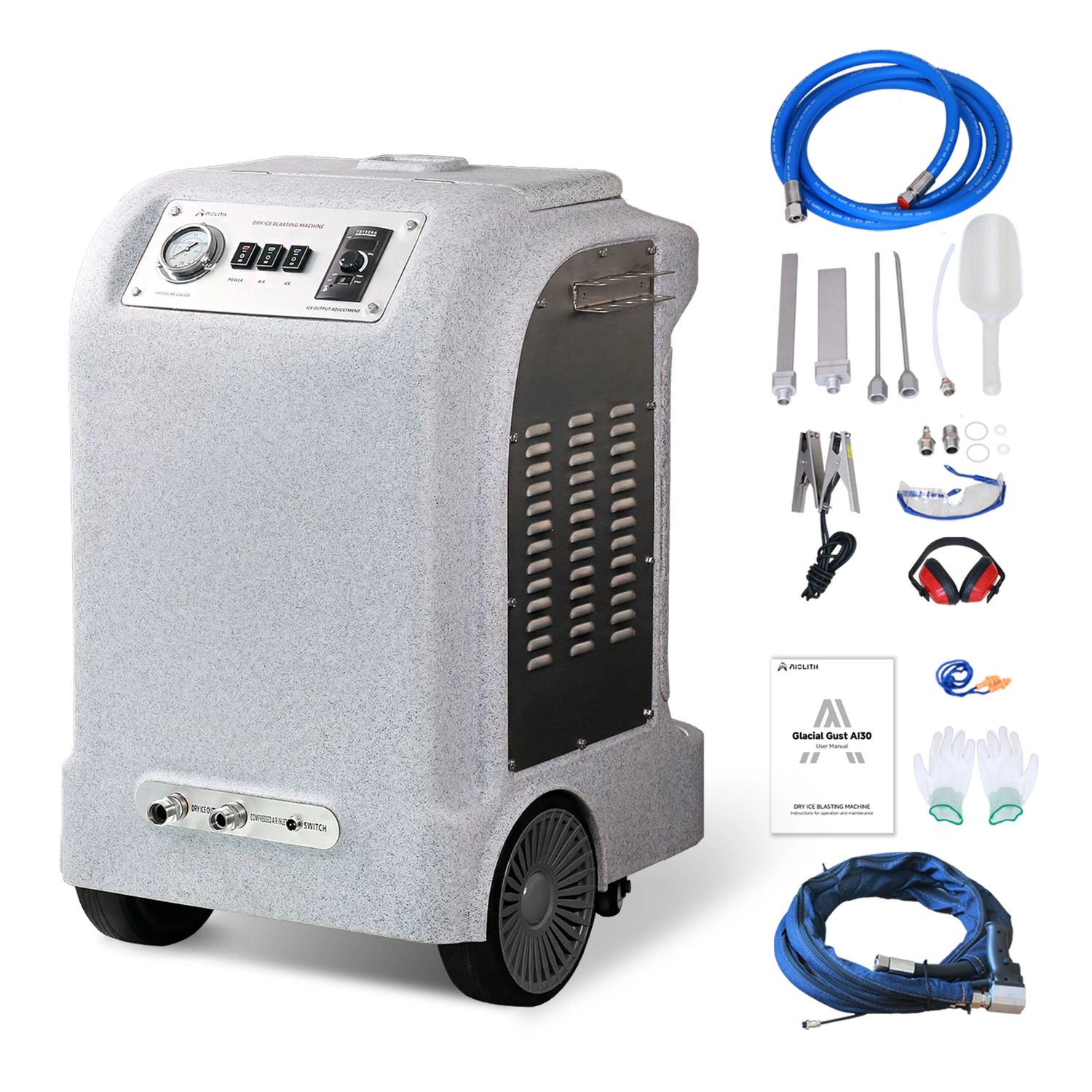The Ultimate Guide to Choosing a Warehouse Floor Scrubber (🎧 Listen Now)
Share
Ever walked through a warehouse and noticed how spotless the floors are? That's no accident.
Clean warehouse floors aren’t just about looks—they’re critical for safety, efficiency, and professionalism. But let’s be honest: cleaning such large spaces isn’t easy. That’s where warehouse floor scrubbers come in.
These machines are workhorses designed to save time, cut costs, and keep your facility in top shape. But with so many models, sizes, and features out there, how do you pick the right one?
Let’s break it all down.
What Is a Warehouse Floor Scrubber?
Definition and Function
A warehouse floor scrubber is a machine that deep cleans industrial floors using water, brushes, and suction. It does more than just mop—it scrubs away grime and then vacuums the dirty water, leaving floors clean and dry in one go.
Manual vs. Automated Scrubbers
Manual scrubbers are operated by a person pushing or riding the machine, while automated (robotic) scrubbers navigate on their own using sensors. Each has its pros depending on your cleaning needs and budget.
Benefits of Using a Floor Scrubber in Warehouses
Time Efficiency
Forget the mop-and-bucket routine. A floor scrubber can clean thousands of square feet in just minutes. That means less downtime and more productivity.
Cost Savings
It might seem like a big investment upfront, but over time, scrubbers reduce labor costs and minimize wear on flooring—saving you serious cash.
Safety Improvements
Slippery or dirty floors are accident magnets. Scrubbers remove oil, dust, and spills quickly, reducing the risk of slips and falls.
Environmental Impact
Modern scrubbers use less water and detergent, making them a greener choice for large-scale cleaning.
Types of Warehouse Floor Scrubbers
Walk-Behind Floor Scrubbers
Perfect for small to mid-sized warehouses. They’re compact, easy to maneuver, and budget-friendly.
Ride-On Floor Scrubbers
These machines are beasts—ideal for larger spaces. The operator rides the machine, making it faster and more ergonomic.
Robotic (Autonomous) Floor Scrubbers
Want cleaning with zero labor? Robotic scrubbers clean on autopilot. Great for 24/7 operations, although pricier.
Cylindrical vs. Disc Scrubbers
Cylindrical scrubbers are best for heavy debris, while disc scrubbers offer a better shine on flat surfaces. Choose based on your floor type.
Key Features to Look For
Battery Life and Charging Time
Longer battery life = fewer interruptions. Look for lithium-ion batteries for faster charging and longer lifespan.
Water Tank Capacity
The larger the tank, the longer you can clean without refills. This is key for big spaces.
Scrubbing Width
Wider scrubbers clean more in fewer passes—ideal for large warehouses.
Noise Levels
If you're cleaning during work hours, quiet operation is a must. Check decibel ratings before buying.
Durability and Build Quality
Industrial spaces are rough—your scrubber should be too. Go for stainless steel components and rugged tires.
How to Choose the Right Scrubber for Your Warehouse
Assessing Warehouse Size
Bigger space? Go ride-on. Smaller? A walk-behind might be all you need.
Type of Debris and Dirt
Oil, grease, dust, or cardboard? Pick a scrubber with the right brush type and power.
Floor Surface Type
Concrete? Epoxy? Tile? Make sure the scrubber is compatible with your surface.
Budget Considerations
Set your budget but think long-term. A cheaper model may cost more in repairs and inefficiency.
Top Brands in the Market
Tennant
Known for durable, high-performance machines. Great support and tech features.
Nilfisk
Reliable, eco-friendly, and easy to operate. A good all-around choice.
Kärcher
European design meets power cleaning. Excellent for both small and large spaces.
Aiolith
Made for tough environments. Industrial-grade parts. Innovative designs with smart controls. Great for tech-savvy teams.
Maintenance Tips for Warehouse Floor Scrubbers
Daily Cleaning Routine
Empty tanks, rinse brushes, and clean filters every day. It takes 10 minutes and prevents long-term issues.
Regular Inspection and Repairs
Check belts, squeegees, and wheels weekly. Don’t let small problems become big repairs.
Battery and Filter Care
Use proper charging habits and clean or replace filters as recommended. It’ll extend the machine's life.
Common Mistakes to Avoid
Skipping Maintenance
Skipping even simple maintenance leads to breakdowns—and downtime.
Overlooking Floor Type Compatibility
Not all scrubbers work on all surfaces. Do your homework before buying.
Underestimating Cleaning Needs
Too small a machine wastes time. Too big? It's clunky. Choose wisely based on square footage.
Renting vs. Buying a Warehouse Floor Scrubber
Pros and Cons of Renting
Renting is cost-effective short-term, perfect for one-off deep cleans or seasonal spikes.
When to Consider Purchasing
If you clean regularly, buying makes more sense long-term. You’ll also have control over usage and maintenance.
Environmental Considerations
Eco-Friendly Cleaning Solutions
Look for scrubbers that support green cleaning solutions and reduce chemical use.
Energy Efficient Models
Newer models are designed to use less power without sacrificing performance.
Case Studies: Real-Life Success Stories
Small Business Implementation
A 5,000 sq. ft. warehouse used to take 3 hours to clean manually. With a compact walk-behind scrubber? Just 40 minutes.
Large Distribution Center Efficiency Boost
A major retailer cut cleaning time by 60% using robotic scrubbers—freeing up labor for other tasks.
Expert Tips for Maximizing Efficiency
- Train staff properly
- Stick to a cleaning schedule
- Use the right cleaning solution
- Don’t ignore error codes—ever
- Invest in high-quality brushes and squeegees
Conclusion
A clean warehouse is a productive warehouse. Investing in the right floor scrubber can transform your facility from grimy to gleaming—saving time, money, and hassle. Whether you go for a walk-behind or a robotic scrubber, the key is choosing one that fits your specific needs. Don’t skimp, don’t rush—do it right the first time, and your floors (and team) will thank you.
FAQs
1. What size floor scrubber do I need for my warehouse?
That depends on your space. Under 10,000 sq. ft.? Go with a walk-behind. Over that? Ride-on or robotic is better.
2. Are robotic floor scrubbers worth the investment?
If you clean frequently and want to save on labor costs long-term, absolutely.
3. How often should I use a floor scrubber in my warehouse?
Ideally, daily or at least a few times a week—depending on foot traffic and debris levels.
4. Can I use a floor scrubber on all types of warehouse floors?
Most, yes. But check compatibility with specific surfaces like epoxy or sealed concrete.
5. What’s the average lifespan of a warehouse floor scrubber?
With proper care? Around 5 to 7 years. High-end models can last even longer.
Please don’t forget to leave a review.
Explore more please contact us: [email protected]

